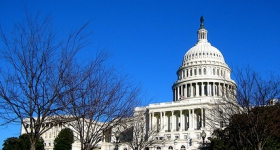This is partly because I have met some of them and have gotten to know them, some through my work as a journalist. I have sat down with them to discuss their lives, what brought them here. I have listened to their stories, talked politics with them, listened to their hopes and dreams.
I know the ones I have spoken with place a lot of hope in demonstrating in order to bring about change in their homelands. As someone who identifies as Asian American, I want to show solidarity with their struggle – and because what they are asking for is something we should all stand for: social justice, and civil and human rights.
I also know a lot of Chinese Americans who follow Tibetan Buddhism and in particular follow the teachings of the Dalai Lama.
My grandfather is one of them. In 1996, he requested that the Dalai Lama do a teaching in Pasadena. That itself is not so surprising, since the Dalai Lama had traveled around the world to speak and teach.
But my grandfather told him he would be teaching to a predominantly Chinese American audience.
This was the first teaching to a Han Chinese audience, according to the Dalai Lama himself and a news account from the World Journal, a Chinese-language newspaper. There were about 800 Chinese Americans, 200 Vietnamese Americans, 200 Tibetan Americans, a few celebrities like Richard Gere and Steven Seagal, and many others, present.
I believe the Dalai Lama agreed to do the teaching in part because it would help bridge the gap between Tibetans and Chinese. After all, as one Tibetan protestor in San Francisco is quoted as saying, he doesn't have a problem with the Chinese people, but the Chinese government.
In subsequent years, the Dalai Lama always agreed to do a special teaching for this audience, and he and my grandfather became good friends, even to this day.
Of course, Chinese Americans in Southern California may be different from Chinese Americans in the San Francisco Bay Area. For example, there are more Taiwanese Americans in the Los Angeles suburbs, who may identify and sympathize more with the Tibetans' plight.
I first saw the Dalai Lama at the 1996 teaching, and was able to meet him in 2004 during another one of his weeklong teachings in Pasadena, CA.
I felt like I was in the presence of someone really special, but I didn't realize the full extent of this "privilege" until I traveled to Lhasa that same year.
I saw firsthand what influence the Han Chinese – including much security in the form of police and military-like people – had on the area. Much of Lhasa was dominated by the Han population, and you could see miles of karaoke bars and restaurants.
And I witnessed the ethnic discrimination there, just as there is racism here in the United States. When we took a taxi into what's now known as "Old Lhasa," where most Tibetans live, our Han Chinese driver warned us to be careful and not to go there at night because we may get mugged. Just his tone of voice around this showed the way Tibetans – in their own land! – were viewed largely as inferior and as criminals. It reminded me of the stereotypical way some view black folks here in the U.S.
When I was there, we talked about the Dalai Lama with Tibetans we grew to know better, such as one of our tour guides. He, like many younger Tibetans, had never seen a photo of the Dalai Lama. Tibetans are banned from owning any likeness of the Dalai Lama, though many still regard him as their spiritual leader.
Just this fact alone – that as a Chinese American, I had the freedom and privilege to attend teachings by the Dalai Lama – really struck me and seemed outrageous. It was an awkward, and yes, shameful sort of privilege, that here I was talking with a Tibetan who will probably never be able to see the Dalai Lama unless he leaves his homeland.
While I was not out at the Wednesday demonstrations, I am showing solidarity with those groups – Tibetans, Burmese – here in this writing, for whatever it is worth.
I didn't want to sit back and let this opportunity to speak up pass me by, after the media limelight has passed, after interest in Tibetans' rights have waned.
There are many, many, many other voices and narratives out there – from Chinese Americans, Burmese Americans, people in Darfur, Uighurs, Tibetans in America, Chinese in Tibet, Taiwanese, other Asian Americans, and all sorts of other people - who have their own unique experiences and perspectives.
Let's hear from them. We all have a lot to learn from one another.










Comments